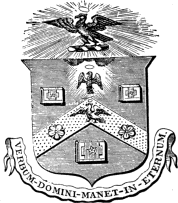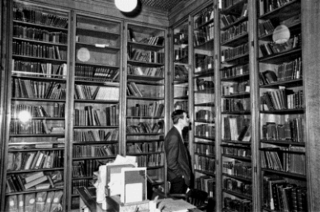
The Bodleian Library is the main research library of the University of Oxford, and is one of the oldest libraries in Europe. It derives its name from its founder, Sir Thomas Bodley. With over 13 million printed items, it is the second-largest library in Britain after the British Library. Under the Legal Deposit Libraries Act 2003, it is one of six legal deposit libraries for works published in the United Kingdom, and under Irish law it is entitled to request a copy of each book published in the Republic of Ireland. Known to Oxford scholars as "Bodley" or "the Bod", it operates principally as a reference library and, in general, documents may not be removed from the reading rooms.

The Worshipful Company of Stationers and Newspaper Makers, usually known as the Stationers' Company, is one of the livery companies of the City of London. The Stationers' Company was formed in 1403; it received a Royal Charter in 1557. It held a monopoly over the publishing industry and was officially responsible for setting and enforcing regulations until the enactment of the Statute of Anne, also known as the Copyright Act of 1710. Once the company received its charter, "the company's role was to regulate and discipline the industry, define proper conduct and maintain its own corporate privileges."

A national library is a library established by a government as a country's preeminent repository of information. Unlike public libraries, these rarely allow citizens to borrow books. Often, they include numerous rare, valuable, or significant works. A national library is that library which has the duty of collecting and preserving the literature of the nation within and outside the country. Thus, national libraries are those libraries whose community is the nation at large. Examples include the British Library in London, and the Bibliothèque nationale de France in Paris.

A chapbook is a type of small printed booklet that was popular medium for street literature throughout early modern Europe. Chapbooks were usually produced cheaply, illustrated with crude woodcuts and printed on a single sheet folded into 8, 12, 16, or 24 pages, sometimes bound with a saddle stitch. Printers provided chapbooks on credit to chapmen, who sold them both from door to door and at markets and fairs, then paying for the stock they sold. The tradition of chapbooks emerged during the 16th century as printed books were becoming affordable, with the medium ultimately reaching its height of popularity during the 17th and 18th centuries. Different ephemera and popular or folk literature were published as chapbooks, such as almanacs, children's literature, folklore, ballads, nursery rhymes, pamphlets, poetry, and political and religious tracts. The term chapbook remains in use by publishers to refer to short, inexpensive booklets.
The International League of Antiquarian Booksellers is a non-profit umbrella organization of bookseller associations, with its legal location in Geneva, Switzerland. It federates 22 National Associations of Antiquarian Booksellers, representing nearly 2000 dealers in 32 countries. Antiquarian booksellers affiliated to the League adhere to the ILAB Code of Ethics, and the League aims to server as a global network for the rare book trade.

The Private Case is a collection of erotica and pornography held initially by the British Museum and then, from 1973, by the British Library. The collection began between 1836 and 1870 and grew from the receipt of books from legal deposit, from the acquisition of bequests and, in some cases, from requests made to the police following their seizures of obscene material.
Alexander Donaldson was a Scottish bookseller, publisher, and printer. Donaldson was the founding publisher of the weekly newspaper, the Edinburgh Advertiser. He was also known for selling cheap copies of books after their copyright had expired in disregard to London booksellers' opinions on literary property.
James Russell Raven LittD FBA FSA is a British scholar specializing in the history of the book. His published works include The English Novel 1770–1829 (2000), The Business of Books (2007), and What is the History of the Book? (2018). As of 2019, he was Professor Emeritus of history at the University of Essex.

Robert George Collier Proctor, often published as R. G. C. Proctor, was an English bibliographer, librarian, book collector, and expert on incunabula and early typography.

The book trade in the United Kingdom has its roots as far back as the 14th century, however the emergence of internet booksellers such as Amazon partnered with the introduction of the e-Book has drastically altered the scope of the industry. Book retailers such as the Borders Group have failed to adjust to these changes, thus there has been a steep decline in the number of operating traditional and independent bookshops. However, still heavily influential on the trade globally, British publishers such as Penguin Books and Pearson remain dominant players within the industry and continue to publish titles globally.
The Lyell Readership in Bibliography is an endowed annual lecture series given at the University of Oxford. Instituted in 1952 by a bequest from the solicitor, book collector and bibliographer, James Patrick Ronaldson Lyell. After Lyell's death, Keeper of the Western Manuscripts at the Bodleian Library, Richard William Hunt, writing of the Lyell bequest noted, "he was a self-taught bibliophile and scholar of extraordinary enthusiasm and discrimination, and one who deserves to be remembered not only by Oxford but by the whole bibliographical world."
As of 2018, five firms in France rank among the world's biggest publishers of books in terms of revenue: Éditions Lefebvre Sarrut, Groupe Albin Michel, Groupe Madrigall, Hachette Livre, and Martinière Groupe.
In 2018, two firms in Spain ranked among the world's biggest publishers of books in terms of revenue: Grupo Planeta and Grupo Santillana. In 2013, there were 524,213 titles in print in Spain, including 76,434 new titles.
Italy is the home of two of the world's biggest publishers of books in terms of revenue: Messaggerie Italiane and Mondadori Libri. Other large publishers include De Agostini Editore, Feltrinelli and the RCS MediaGroup.
As of 2018, ten firms in Germany rank among the world's biggest publishers of books in terms of revenue: C.H. Beck, Bertelsmann, Cornelsen Verlag, Haufe-Gruppe, Holtzbrinck Publishing Group, Ernst Klett Verlag, Springer Nature, Thieme, WEKA Holding, and Westermann Druck- und Verlagsgruppe. Overall, "Germany has some 2,000 publishing houses, and more than 90,000 titles reach the public each year, a production surpassed only by the United States." Unlike many other countries, "book publishing is not centered in a single city but is concentrated fairly evenly in Berlin, Hamburg, and the regional metropolises of Cologne, Frankfurt, Stuttgart, and Munich."

As of 2018, Wolters Kluwer ranks as the Dutch biggest publisher of books in terms of revenue. Other notable Dutch houses include Brill and Elsevier.
As of 2018, several firms in the United States rank among the world's biggest publishers of books in terms of revenue: Cengage Learning, HarperCollins, Houghton Mifflin Harcourt, McGraw-Hill Education, Scholastic, Simon & Schuster, and Wiley.
Mary Teresa Josephine Webber, is a British palaeographer, medievalist, and academic. She has been a Fellow of Trinity College, Cambridge since 1997 and Professor of Palaeography at the Faculty of History, University of Cambridge since 2018. Webber studied Modern History as an undergraduate at Somerville College, Oxford.

The selling of books dates back to ancient times. The founding of libraries in c.300 BC stimulated the energies of the Athenian booksellers. In Rome, toward the end of the republic, it became the fashion to have a library, and Roman booksellers carried on a flourishing trade.
Simms and McIntyre was a 19th century printing and publishing company from Belfast, Ireland. The company published The Parlour Library, an innovative book series of cheap reprints of titles in attractive physical formats and sold at very low prices, both of which features which were later imitated by other publishers.












